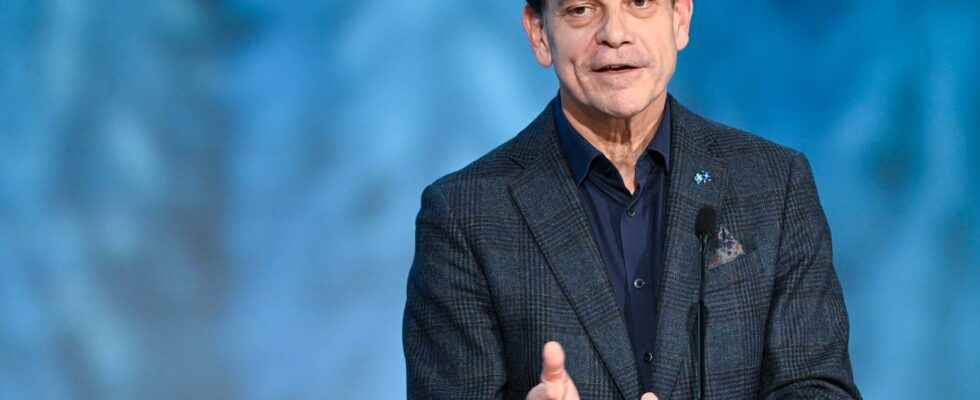Published: Just now
Sweden is facing major challenges, according to Sweden’s first national security advisor.
Henrik Landerholm has created his security council after the British model and wants several new chancelleries to help him.
– We are now in something of the eye of the storm, he says.
In November, Henrik Landerholm was appointed Sweden’s first national security advisor. Before that, he was director general at the Agency for Psychological Defense.
The first time he spent building a new national security council.
– The background is well known, the challenges are great, he said in a speech at the People and Defense National Conference in Sälen earlier this week.
In addition to the worrying external developments with the Russian aggressions, there are many other threats to take into account, he emphasizes.
– The risks and opportunities of technology, climate change, pandemics and antagonistic threats such as cyber warfare and influence campaigns have created a game plan where not only military means determine the outcome of a conflict, says Henrik Landerholm.
– Through the National Security Council, a forum is created within the government for important and difficult trade-offs.
Frequent meetings
Prime Minister Ulf Kristersson (M) announced in the government declaration that a national security council would be established.
The Council will be chaired by the Prime Minister. In addition, the foreign minister, the two defense ministers, the justice minister, the finance minister and the party leaders of the other coalition parties will be included, according to Landerholm.
Other government ministers may be called in if necessary, as well as representatives of authorities and business. The role of the National Security Adviser will be to assist the Council.
According to Landerholm, the council must meet “in principle” every two weeks.
– The frequency of meetings is important in itself. It creates a familiarity with the questions, he says.
Impressions have been taken from the British system.
– The British equivalent meets every Monday that the Prime Minister is in London and thus has an even higher frequency of meetings.
However, the Council does not have a decision-making mandate.
– The Minister will not make a decision in this context. Rather, it is to find an ongoing consensus around security policy issues large and small.
New chancelleries
Landerholm also proposes several new functions to support the council.
The current crisis management office gets a central part. But in addition, Landerholm wants to build three more offices: one for foreign and security policy, one for strategic analysis and one for intelligence coordination, with an associated national intelligence council. It is not clear how many people will work in these bodies.
The plans for the new council have created concern in some quarters, according to Landerholm.
– I have felt vibrations from a number of ministries. Not primarily on a political level, but it is clear that it hurts a little sometimes when buds break, he says during a question and answer session after his speech.
It is not certain that everyone perceives the new order as a win-win situation, he says.
– The notion that someone loses because a new player enters the arena probably exists here and everywhere.
“The eye of the storm”
High on the National Security Council’s agenda this spring is support for the reconstruction of Ukraine, energy security, the relationship with world powers such as China – and NATO.
– Membership in NATO will probably be more revolutionary than what we in the political establishment, authorities and citizens can actually imagine, says Landerholm.
The council must also draw up the lines for a new national security strategy.
Sweden’s current national security strategy was developed by the Löfven government in 2017. It was then attacked by M and L for being out of money. Whether there will be any money now is unclear. Landerholm says in his speech that the strategy “may even include resource allocation”.
Landerholm emphasizes that Sweden and Europe are facing a paradigm shift in security policy.
– There are many of us who used to believe that we lived in a turning point. We have behind us more than 30 years of upheavals, all of which have been formative. But now we are in something of the eye of the storm.
Facts
Henrik Landerholm
Henrik Landerholm, new national security advisor to the government.
59 years.
Leaves after just one year the position as director general of the Psychological Defense Agency.
Officer in the foundation, now lieutenant colonel in the reserve.
Was a member of parliament for the Moderates 1991–2002, the last four years chairman of the defense committee.
Has been rector of the Norwegian Defense Academy and director general of the Folke Bernadotte Academy.
From 2011 to 2021, he was attached to the Ministry of Foreign Affairs. Led the Swedish mission in northern Afghanistan for two years and was then ambassador to Latvia and the United Arab Emirates.
Sources: Government Offices, Riksdag.
Read more
